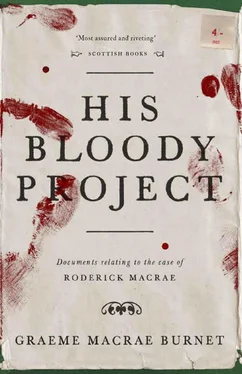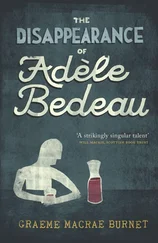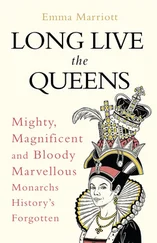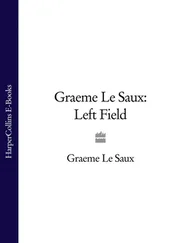Graeme Burnet - His Bloody Project
Здесь есть возможность читать онлайн «Graeme Burnet - His Bloody Project» весь текст электронной книги совершенно бесплатно (целиком полную версию без сокращений). В некоторых случаях можно слушать аудио, скачать через торрент в формате fb2 и присутствует краткое содержание. Год выпуска: 2015, Издательство: Contraband, Жанр: Современная проза, на английском языке. Описание произведения, (предисловие) а так же отзывы посетителей доступны на портале библиотеки ЛибКат.
- Название:His Bloody Project
- Автор:
- Издательство:Contraband
- Жанр:
- Год:2015
- ISBN:нет данных
- Рейтинг книги:5 / 5. Голосов: 1
-
Избранное:Добавить в избранное
- Отзывы:
-
Ваша оценка:
- 100
- 1
- 2
- 3
- 4
- 5
His Bloody Project: краткое содержание, описание и аннотация
Предлагаем к чтению аннотацию, описание, краткое содержание или предисловие (зависит от того, что написал сам автор книги «His Bloody Project»). Если вы не нашли необходимую информацию о книге — напишите в комментариях, мы постараемся отыскать её.
A brutal triple murder in a remote northwestern crofting community in 1869 leads to the arrest of a young man by the name of Roderick Macrae. There’s no question that Macrae is guilty, but the police and courts must uncover what drove him to murder the local village constable.
And who were the other two victims? Ultimately, Macrae’s fate hinges on one key question: is he insane?
His Bloody Project — читать онлайн бесплатно полную книгу (весь текст) целиком
Ниже представлен текст книги, разбитый по страницам. Система сохранения места последней прочитанной страницы, позволяет с удобством читать онлайн бесплатно книгу «His Bloody Project», без необходимости каждый раз заново искать на чём Вы остановились. Поставьте закладку, и сможете в любой момент перейти на страницу, на которой закончили чтение.
Интервал:
Закладка:
‘We have listened,’ he continued, ‘to an entertaining dialogue between Mr Thomson and Mr Sinclair regarding the motives for these crimes and their implications as to the state of mind of the accused. Nonetheless, fascinating as their discussion undoubtedly was, they are dancing on the head of a pin.’
He then re-counted the various incidents which had occurred between Mr Mackenzie and the prisoner’s father, culminating in the eviction of the Macrae family from their home. ‘It was this that provided the motive for the defendant’s actions; the motive but not the justification. We have heard also that the defendant harboured some romantic feelings towards Flora Mackenzie, feelings he expressed in the grossest manner, and perhaps his rejection by her contributed to the enmity he felt towards the Mackenzie family. It may be true that we do not know — that we cannot know — the true motives for this attack, but, gentlemen, it matters not.’
Mr Gifford then took pause before delivering his final remarks. ‘I would remind you of the facts: Roderick Macrae went fore-armed to the house of Mr Mackenzie with the intention to kill, and kill he did. The prisoner himself, as we have heard from numerous witnesses, has made no attempt to exonerate himself from blame and nor should you. And if you harbour any doubts as to his sanity, we have heard from not one but two experienced specialists, both far more qualified than you or I to pass judgement on this matter. We heard first from Dr Hector Munro, a man of great experience in dealing with the criminal population and with demonstrable knowledge of the signs of insanity. His verdict: not only is Roderick Macrae fully in possession of his reason, he is “among the most articulate and intelligent prisoners” the doctor has examined.
‘We have been privileged to hear also from Mr James Bruce Thomson, who you must bear in mind was the defence’s own witness; a man whose expertise in this field is indisputable. And his conclusion? That Roderick Macrae is fully in possession of his reason and no more than a wicked and dissembling individual.
‘Finally, we have the declaration of the prisoner himself, offered under no duress: “I am of sound mind.” Gentlemen, the only person in this court-room who believes — or professes to believe — the prisoner to be insane is my colleague, Mr Sinclair. But this belief flies in the face of the evidence presented to the court.’
The jury, Mr Gifford concluded, would be derelict in their duty if they returned any verdict other than guilty of each of three charges before them.
When Mr Sinclair rose to make his closing remarks to the jury, it was not with the air of a beaten man. He had, wrote Mr Philby, ‘rallied commendably from his humiliation at the hands of his own witness, and if there is an award for those who most zealously defend lost causes it should be awarded to the doughty advocate’.
‘Gentlemen, as my learned colleague has stated, the facts of this tragic case are not in question,’ he began, resting his hand on the partition of the jurymen’s benches. ‘The defence does not dispute that the unfortunate victims died at the hand of the prisoner. What is at issue here are not the bare facts of the case, but the contents of a man’s mind. I would aver that there are not three victims in this case, but four; the fourth being the wretched individual who has sat before you these three days. And who is this individual? A young man of a mere seventeen years; a hard-working crofter with a deep attachment and loyalty to his family. We have heard how deeply changed he was by the tragic death of his beloved mother, and how since that time his family have existed under a cloak of gloom. We have heard from the prisoner’s own father, the father to whom he is so devoted, that he regularly beat him with his fists. We have heard from his neighbours, Carmina and Kenneth Murchison, that he was in the habit of conducting animated conversations with himself, conversations which ceased whenever a third party drew near, a fact which perhaps speaks of the disturbing nature of the thoughts to which he was giving voice. Mr Murchison testified that the prisoner appeared to “exist in a world of his own”. Mr Aeneas Mackenzie was more forthright. Roderick Macrae, he testified, was regarded as the village idiot; an imbecile; an individual whose behaviour was often incongruous with his surroundings. I suspect that if other witnesses have been more reluctant to brand the prisoner insane, this is due only to the tolerance and good nature of the residents of Culduie. Mr Mackenzie in his blunt way was only giving voice to what everyone thought. We have heard too how Roderick Macrae was given to violent swings of mood and eccentric behaviour. By any measure, he was not of sound mind. And when Lachlan Mackenzie, in his newly acquired role of village constable, took to abusing his power to persecute — for there can be no other word to describe his actions — to persecute Roderick’s family, this disturbed young man was pushed beyond the edge of reason. At the very end of his tether, Roderick set out to kill Lachlan Mackenzie and in carrying out this terrible project, claimed the lives of two innocent bystanders.
‘These were dreadful acts, of that there is no question. But it is what happened in the aftermath of these acts which speaks to the state of Roderick Macrae’s mind. Did he behave as you or I would behave? As any sane person would? Did he attempt to flee, or to deny responsibility for the acts he had committed? He did not. He quite calmly gave himself up to capture and openly admitted what he had done. He expressed no remorse. And at no point since has he wavered from this stance.
‘Gentlemen, you must ask yourselves why he behaved in this way. The answer can only be that in his own mind he did not believe — he does not believe — he had done anything wrong. In the mind of Roderick Macrae the acts he committed were a just and unavoidable reaction to the harassment of his family. Of course, in this he is wrong. Every man and woman in this court,’ — he here gestured grandly around the room — ‘can see that what he did was wrong. But Roderick Macrae cannot. And herein lies the crux of the case. Roderick Macrae no longer knew right from wrong. In order for a crime to be committed there must be a physical act — which is not here in dispute — but there must also be a mental act. The perpetrator of the act must know that what he was doing was wrong. And Roderick Macrae did not know.
‘Now, you will have listened intently, as you should, to the evidence of the learned Mr Thomson. He speculated — I shall not shy away from it — that the true object of Roderick Macrae’s assault was not Lachlan Mackenzie, but his daughter, Flora. But I would put it to you, I would put it to you strongly, that Mr Thomson’s opinion of this detail of the case is nothing more than speculation. What would it entail to believe that he is correct? It would require us to believe that in the immediate aftermath of his assault — in the very moments after the commission of three bloody murders — Roderick was able to fabricate a falsified explanation for what he had done. It is inconceivable that any sane person could have the self-possession to do such a thing.’
Mr Sinclair paused, placing a finger to his lips and casting his eyes towards the ceiling, as if he was himself in the process of thinking this question through, before continuing.
‘One might contend that the accused had concocted this story in advance of his actions, that he went to the Mackenzie home to kill Flora, but intended afterwards to claim that he had gone there with the purpose of killing her father. But there is a fatal flaw in this narrative: Roderick did not know and could not know that Lachlan Mackenzie would return home and disturb him in his actions. To give credence to Mr Thomson’s version of events requires the most convoluted thinking, and, I would aver, a complete disregard for logic. Instead, all the evidence presented here in court points to the fact that the prisoner intended to kill Lachlan Mackenzie, an act which, in his own disturbed mind, was just and righteous. The fact that in the commission of this deed, he also took the lives of Flora Mackenzie and Donald Mackenzie, a mere child, speaks eloquently of the alienation of reason he experienced. Mr Thomson quite correctly drew your attention to the horrible injuries inflicted on the person of Flora Mackenzie, but I would ask you, are these the actions of an individual in possession of his reason? Quite clearly, gentlemen, they are not. And if one accepts the view — the view to which all the evidence points — that Roderick Macrae killed Lachlan Mackenzie out of an irresistible urge to avenge himself for the ills done to his family, then you must agree with Mr Thomson that Roderick Macrae was not in possession of his reason, that he was suffering from “mania without delirium” or “moral insanity” and thus cannot be deemed to be responsible in law for his actions.
Читать дальшеИнтервал:
Закладка:
Похожие книги на «His Bloody Project»
Представляем Вашему вниманию похожие книги на «His Bloody Project» списком для выбора. Мы отобрали схожую по названию и смыслу литературу в надежде предоставить читателям больше вариантов отыскать новые, интересные, ещё непрочитанные произведения.
Обсуждение, отзывы о книге «His Bloody Project» и просто собственные мнения читателей. Оставьте ваши комментарии, напишите, что Вы думаете о произведении, его смысле или главных героях. Укажите что конкретно понравилось, а что нет, и почему Вы так считаете.












